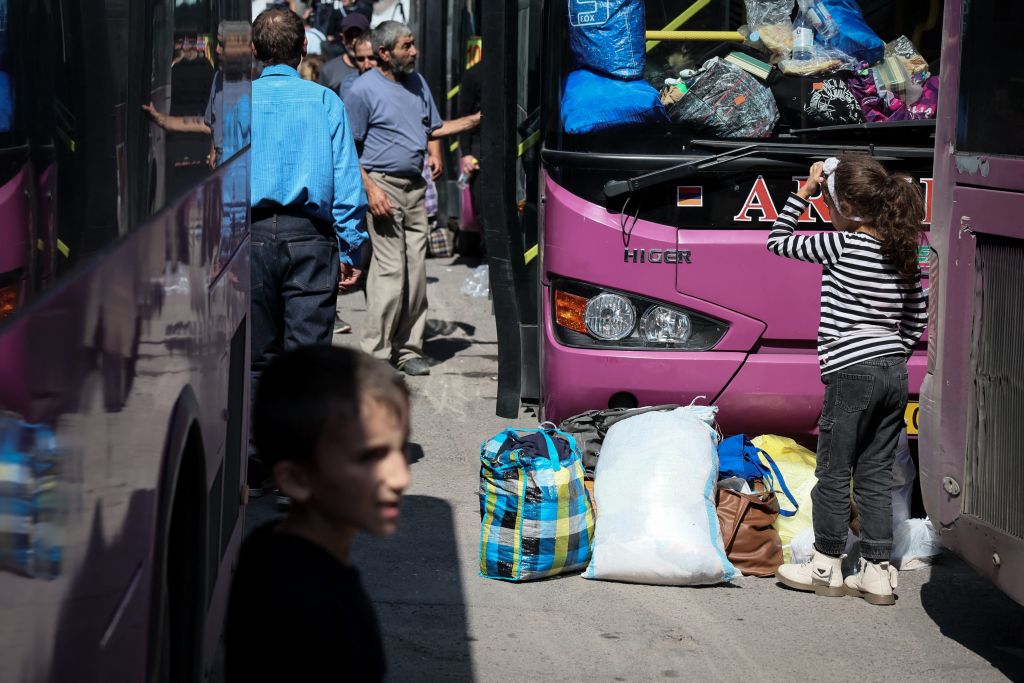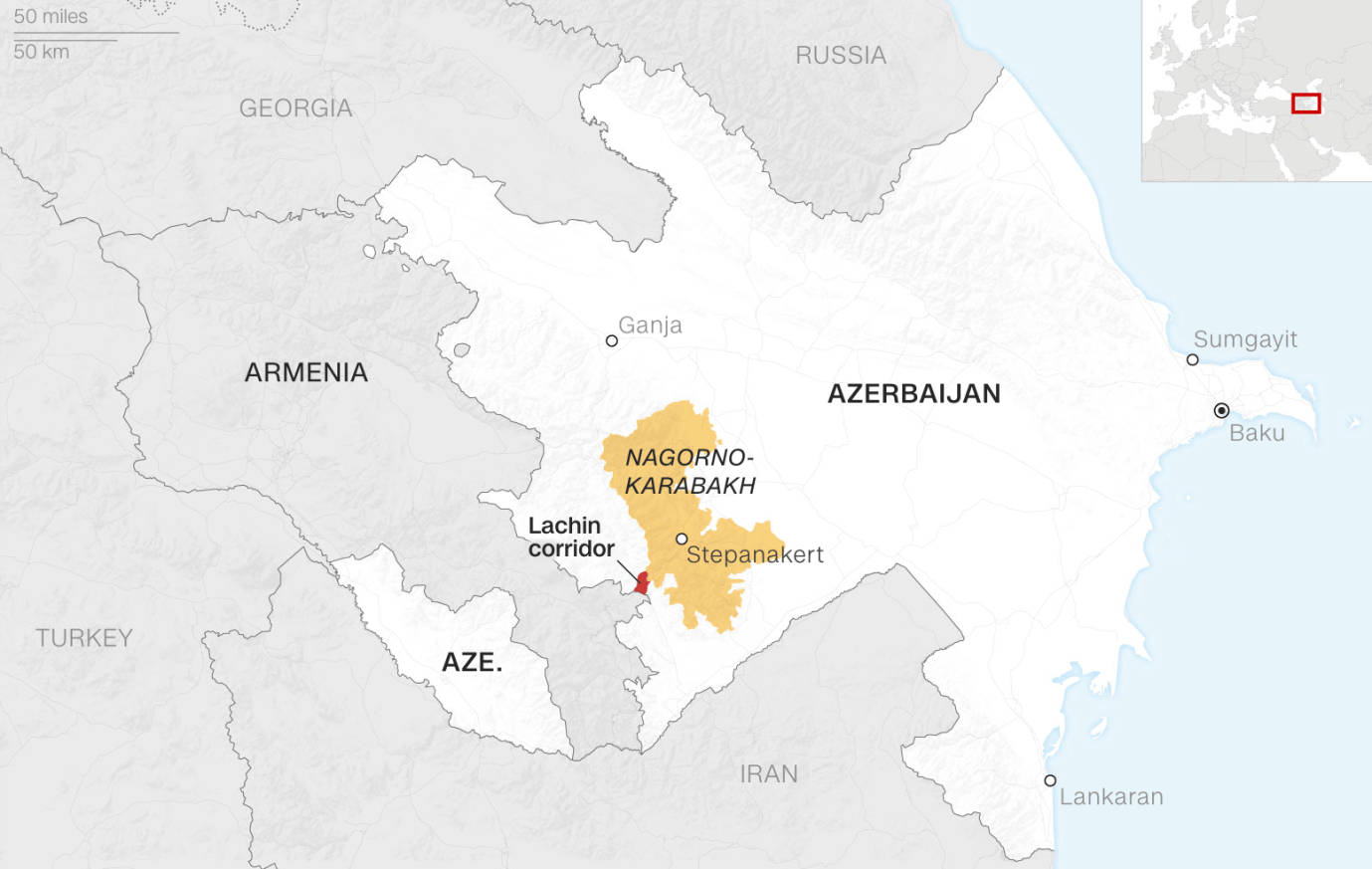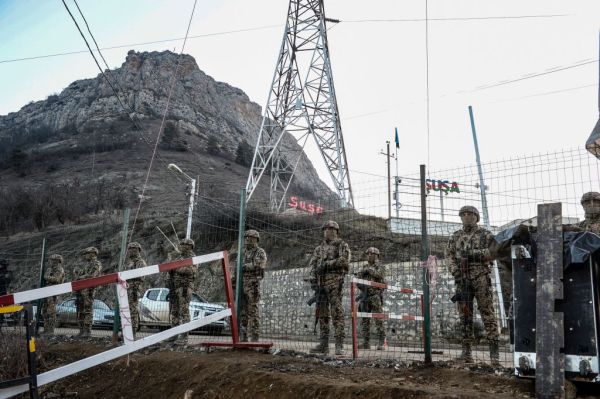Happy Tuesday! In welcoming TMD’s new editor, James Scimecca, please also offer him a word of condolence for his New York Jets’ brutal loss to the Kansas City Chiefs Sunday night. Better luck on a night when Taylor Swift isn’t in attendance, James.
Quick Hits: Today’s Top Stories
- The United Nations Security Council voted Monday to approve a U.S.-authored resolution to send a multinational force, led by Kenya, to Haiti. The force—while approved by the U.N. would not formally be under the body’s control—has authorization to deploy to Haiti for one year, with a review at nine months, to help Haitian leaders combat the gang violence that has destabilized the country. Kenyan Foreign Affairs Minister Alfred Mutua signaled the force could be in the country before the end of the year, though it was not clear how large the effort would be.
- A publicly available summary of a classified State Department watchdog report published late last month suggested the Biden administration’s emphasis on projecting stability during the August 2021 withdrawal from Afghanistan hampered efforts at the U.S. embassy in Kabul to adequately prepare for the drawdown. “[The Office of the Inspector General] found that embassy leadership expressed apprehension about taking overt actions in preparation for an evacuation, concerned that such actions would undermine diplomatic support for the government of Afghanistan and cause panic within that government, the broader Afghan population, and Embassy Kabul,” the inspector general report says. “Because of this effort to avoid signaling a lack of support for the Afghan government, communication with embassy personnel about the timing and scope of a potential evacuation was unclear.” A full and classified version of the report was provided to Congress and the State Department.
- The foreign ministers of all 27 European Union countries visited Kyiv Monday in a forceful show of European support for the war-torn country after the U.S. Congress failed to include additional aid for Ukraine in the last-minute deal to extend government funding. In neighboring Slovakia, meanwhile, the pro-Russian, leftwing, populist Smer party won this past Saturday’s elections. Smer party leader and former Slovakian Prime Minister Robert Fico campaigned on curtailing military aid to Ukraine and blocking Kyiv’s entry into NATO. The party must now form a coalition government.
- The Supreme Court on Monday declined to take up an appeal from former Trump lawyer John Eastman, who played an instrumental role in crafting the legal theory that would have seen former Vice President Mike Pence reject electoral votes on January 6, 2021. Eastman was seeking to have the court scrub a ruling by a federal judge that forced him to release several of his otherwise privileged emails to Congress’ January 6 Select Committee, arguing that forcing their release under the so-called “crime-fraud” exception to attorney-client privilege “cast aspersions not just on Dr. Eastman but also on his former client, the former President of the United States who is a candidate for the office of President in 2024.” Justice Clarence Thomas recused himself from the court’s ruling. As is customary in such situations, he did not provide a reason for his recusal—but Eastman clerked for Thomas, and Thomas’s wife, Ginni, was in communication with Eastman in the leadup to January 6.
- Former President Donald Trump appeared in a New York City court on Monday for the first day of a sweeping civil suit. The lawsuit, brought by New York Attorney General Letitia James, alleges Trump, his two eldest sons, and executives at the Trump Organization committed financial fraud and falsified business records. The judge overseeing the case, Arthur Engoron, issued a pretrial summary judgment last week ruling Trump had committed fraud by exaggerating his net worth on financial statements. The trial will now review six additional claims—including insurance fraud and conspiracy—and determine the damages owed related to last week’s fraud ruling. The outcome of the case could affect the Trump Organization’s continued ability to do business in New York.
- Two scientists—Katalin Karikó, who is Hungarian, and Drew Weissman, an American—were awarded the Nobel prize in medicine for their research on messenger RNA, which was a crucial component in the development of the mRNA COVID-19 vaccine. “Through their groundbreaking findings, which have fundamentally changed our understanding of how mRNA interacts with our immune system, the laureates contributed to the unprecedented rate of vaccine development during one of the greatest threats to human health in modern times,” the Nobel Assembly wrote.
- GOP Florida Rep. Matt Gaetz on Monday introduced a “motion to vacate,” a procedural mechanism which could result in Kevin McCarthy’s ouster from his post as speaker of the House. In a speech on the House floor Monday evening, Gaetz accused McCarthy of negotiating a secret deal with President Joe Biden to fund aid to Ukraine after the speaker relied on Democratic votes to pass a continuing resolution to extend government funding until mid-November. The measure, which requires a majority to pass, must be voted on within two legislative days, and could trigger a vote that would remove McCarthy as speaker. Democratic leadership has not yet signaled whether or not it would support an effort to topple McCarthy. “Bring it on,” McCarthy said following Gaetz’s motion.
The Long Fall of Nagorno-Karabakh

An empty town square roamed by stray dogs. Chairs strewn about alongside abandoned luggage, bicycles, and strollers. Cars left deserted in the street. Such is the scene in Stepanakert—the capital of the ethnic Armenian-run region of Nagorno-Karabakh, a disputed stretch of land generally considered to be part of Azerbaijan—after Azerbaijani military forces seized control of the territory in mid-September. The city that had a population of 75,000 people emptied, essentially overnight, leaving what the first journalists to access the area this weekend described as a “ghost town with no soul.”
On Tuesday, September 19, Azerbaijan—a Muslim-majority former Soviet republic in the Caucasus—launched what appeared to be the final stroke of a more than 30-year war with Armenian-backed separatist forces in Nagorno-Karabakh, driving more than 100,000 people to flee across the border to Armenia. Azerbaijan’s attack increases the potential for escalation into a wider conflict with Armenia and spells failure for Western diplomatic efforts to prevent the use of hard power to resolve the territorial dispute, leaving Armenians who fled Nagorno-Karabakh separated from land their ancestors had called home for thousands of years.
Sandwiched between Europe, Asia, and the Middle East lies Armenia—the world’s oldest Christian country. Azerbaijan borders Armenia to the East, and Nagorno-Karabakh is a disputed territory within Azerbaijian’s borders, geographically separated from Armenia but still home to a majority ethnic Armenian population. Although it’s not officially recognized by any other country or international body as an independent state, the territory—also known as the Republic of Artsakh—boasted its own government and defense forces until this month.

Azerbaijan’s lightning war took control of Nagorno-Karabakh in little more than a day, but the strike was preceded by a nine-month blockade of the mountainous Lachin Corridor—the only land route connecting Nagorno-Karabakh to Armenia. Azerbaijan blocked the route in December under the guise of an environmental protest against coal mines, but the military soon set up a checkpoint that effectively cut off food and medical aid from reaching the territory. The siege pushed the population to the brink of starvation; Azerbaijan extended offers of aid but the Artsakh Armenians rejected the effort as a ploy to gain more control. Azerbaijan finally let a Red Cross shipment of food through the Lachin checkpoint on September 18, but followed it up with artillery strikes just hours later.
The Artsakh forces—quickly overwhelmed by the Azerbaijani military—agreed to a ceasefire deal the day following the attack that disbanded and disarmed their troops, and will officially dissolve the Republic of Artsakh at the end of the year. Azerbaijan is continuing to arrest and charge Artsakh officials, alleging they committed war crimes. Armenian Prime Minister Nikol Pashinyan condemned the attack as an act of ethnic cleansing but has emphasized that the Armenian military is not involved in the conflict.
More than 100,000 of the 120,000 Armenians in Nagorno-Karabakh have fled, Armenian officials reported. “Massive amounts of people were coming through with many of them just [having] the clothes on their backs or whatever they were able to grab,” Sarah Stites, an Armenian-American dual citizen living in Armenia, tells TMD. The exodus is nearly over, but resources are stretched thin as Armenia cares for its new refugee population. Stites was in Goris yesterday—an Armenian border city functioning as a transit point for those fleeing Nagorno-Karabakh—speaking with the displaced Armenians. “You can tell from the eyes if a family’s from Artsakh because they have this haunted look, this lost look,” she says. “People’s reaction is just this feeling, ‘Really, again, why is this nation tortured, why is this people so tortured?’”
Armenians’ cultural and religious ties to Nagorno-Karabakh date back thousands of years. “The best analogy I have for Artsakh or Nagorno-Karabakh is it is to Armenians what Judea and Samaria is to Jews,” Robert Nicholson—head of the Philos Project, an advocacy organization promoting Christian engagement in the Near East—tells TMD.
The Azerbaijani government has previously tried to destroy and erase Armenian culture in areas over which it has taken control. The Caucasus Heritage Watch—an investigative research project led by researchers at Purdue and Cornell Universities—found that 98 percent of Armenian cultural heritage sites identified by satellite imagery in Nakhchivan, an Azerbaijani exclave, had been destroyed between 1997 and 2011. “Armenians will leave behind a rich cultural and religious landscape with scores of heritage sites, from exquisite medieval monasteries to modest village churches, to historic cemeteries with iconic engraved cross stones,” Lori Khatchadourian—a co-director of the project—said last month of the crisis in Nagorno-Karabakh. “If Azerbaijan takes sovereign control over Nagorno-Karabakh, we estimate that an additional 200-300 Armenian cultural heritage sites will be endangered.”
A tragic record of military conflict and ethnic cleansing hangs over the region, with Nagorno-Karabakh’s autonomous status a product of the Soviet Union’s rise and fall. After the collapse of the Russian empire in 1917, Armenia and Azerbaijan declared independence and went to war over Nagorno-Karabakh and other disputed territories, but the Soviet Union quickly recaptured both countries and established Nagorno-Karabakh as an autonomous oblast within Azerbaijan. Seeing the writing on the wall for the Soviets in 1988, forces in Nagorno-Karabakh moved for independence from Azerbaijan and unification with Armenia, sparking a bloody war with Azerbaijan that killed more than 30,000 people and ended in 1994 with Armenian forces in control of Nagorno-Karabakh and the surrounding districts.
The conflict displaced hundreds of thousands of Azeris living in the territory and in Armenia, as well as Armenians who had previously lived in Azerbaijan. It also left the status of Nagorno-Karabakh unresolved—Armenians controlled it as an effectively autonomous state with the functional backing of Armenia even as Azerbaijan maintained its claim to the territory, and some human rights advocates see the emptying of Nagorno-Karabakh as an extension of previous ethnic cleansing. “We should think of it as religious cleansing,” Sam Brownback—the former U.S. Ambassador-at-Large for International Religious Freedom and former senator from and governor of Kansas—tells TMD. “We’ve never defined religious cleansing in our own statutes, but that’s what’s happening.” Brownback and Nicholson co-led an American delegation to Armenia this summer, meeting with stakeholders and government leaders.
The tide of the struggle began to turn against the Armenians in the 2010s as Azerbaijan built up its military strength, culminating in a 2020 war initiated by Azerbaijan and backed by their neighboring ally Turkey. The 44-day conflict involved Artsakh and Armenian troops and seriously degraded both fighting forces. Azerbaijan took back the buffer districts surrounding Nagorno-Karabakh and even gained control of several towns within the region itself. The Armenians were forced to accept a truce brokered by Russia and enforced by approximately 2,000 Russian peacekeepers deployed along the Lachin Corridor.
But cracks quickly began to emerge in those peacekeepers’ efforts to deter aggression. Azerbaijan launched an incursion in September 2022, seizing territory in Armenia proper, and the move was met with little reaction from Russia or the West. “There was a lack of action from everyone,” Benyamin Poghosyan—a senior fellow at the Applied Policy Research Institute of Armenia—tells TMD. “Neither Russia nor U.S. nor EU did [any] real steps to somehow punish Azerbaijan for this attack, and still Azerbaijani troops are in Armenian territory.”
Last month’s attack reflected the culmination of Armenia’s defeat in 2020 and losses in 2022, and this time Armenia’s leaders opted not to defend the territory. In 2022, Pashinyan, the Armenian prime minister, publicly signaled that Armenia renounced its claims to Nagorno-Karabakh, a reflection of the country’s weakened position and lack of international support. “No European country or the U.S. is ready to send troops involving military clashes with Azerbaijan,” Poghosyan tells TMD. “So, all this maybe gave Pashinyan an understanding that, if he [does not cede] Nagorno-Karabakh, then Azerbaijan will attack Armenia more and more.”
While Russia has historically been an ally to Armenia, the war in Ukraine has both stretched the Kremlin’s military resources and reduced its appetite to get involved in another conflict—as well as strengthened its reliance on Azerbaijan. Facing sanctions, Russia has increasingly turned to Azerbaijan to absorb its energy exports. What’s more, Pashinyan has begun strengthening ties with the U.S., further souring Armenia’s relationship with Russia. Last month, the U.S. held military exercises with Armenian forces, and Secretary of State Antony Blinken hosted peace talks with Armenia and Azerbaijan in Washington as recently as this May, claiming “tangible progress” had been made.
To Armenia’s backers in the U.S., these latest developments represent a subdued response by the Biden administration—and a major disappointment. “It’s a full-scale disaster,” Brownback argues. “They failed to use the tools that were readily available to them to stop this from happening. And when they failed to use the tools, I think Turkey, which controls Azerbaijan, read it as weakness and acted aggressively.”
Just five days before the mid-September attack, Yuri Kim—an acting assistant secretary of state for European affairs—told the Senate Foreign Relations Committee that “the United States will not countenance any action or effort—short-term or long-term—to ethnically cleanse or commit other atrocities against the Armenian population of Nagorno-Karabakh.”
“We have also made it abundantly clear that the use of force is not acceptable,” she added.
Armenian advocates and some lawmakers have pushed for the U.S. to send more aid to Armenia, cut off American military assistance to Azerbaijan, and sanction Azerbaijani officials. “Give the Armenians a giant bear hug, right now,” Nicholson argues. “They need it, from aid to security, more military exercises.” Kim and U.S. Agency for International Development (USAID) Administrator Samantha Power visited Armenia last week in a show of support, but the U.S. has announced only $11.5 million—a little more than $100 for each of the more than 100,000 Nagorno-Karabakh refugees—in humanitarian aid for the country so far, drawing criticism from some Armenians. “We’re looking at what the appropriate response is,” Power told reporters at a press conference when asked about U.S. inaction on Azerbaijan’s use of force. She also met with Azerbaijani President Ilham Aliyev in Baku last week.
Azerbaijan is already signaling that another confrontation with Armenia could soon follow. Aliyev and Turkish President Tayyip Erdoğan have begun publicly pushing for a land corridor in southern Armenia that would be controlled by Azerbaijan and connect mainland Azerbaijan with Nakhchivan—Azerbaijani territory on the Western border of Armenia. Plus, Aliyev and the Azerbaijani parliament have begun to voice concerns over “Western Azerbaijan,” referring to Armenian territory that Aliyev maintains dubious claims to. Poghosyan worries it will be used as a pretext for another attack, saying the risk of more conflict in the near future is “quite likely.”
Brownback agrees it’s a cause for concern. “I could see one of two scenarios very easily happening,” he tells TMD. “Either this government in Armenia gets thrown out and a regime favorable to Russia gets installed, or the Azeris with Turkey’s backing just attack Armenia proper and try to take it militarily as they’ve done in Nagorno-Karabakh.”
Worth Your Time
- In a lengthy statement to CNN, former President Donald Trump’s longest-serving chief of staff John Kelly publicly confirmed for the first time some previously reported stories about the former president and condemned his positions—and lack thereof—on everything from veterans to abortion. “What can I add that has not already been said?” Kelly told CNN, calling Trump, “a person that thinks those who defend their country in uniform, or are shot down or seriously wounded in combat, or spend years being tortured as POWs are all ‘suckers’ because ‘there is nothing in it for them.’ A person that did not want to be seen in the presence of military amputees because ‘it doesn’t look good for me.’ A person who demonstrated open contempt for a Gold Star family—for all Gold Star families—on TV during the 2016 campaign, and rants that our most precious heroes who gave their lives in America’s defense are ‘losers’ and wouldn’t visit their graves in France. A person who is not truthful regarding his position on the protection of unborn life, on women, on minorities, on evangelical Christians, on Jews, on working men and women. A person that has no idea what America stands for and has no idea what America is all about. A person who cavalierly suggests that a selfless warrior who has served his country for 40 years in peacetime and war should lose his life for treason—in expectation that someone will take action. A person who admires autocrats and murderous dictators. A person that has nothing but contempt for our democratic institutions, our Constitution, and the rule of law. There is nothing more that can be said. God help us.”
- Do you take “sides” or do you have “positions”? For the good of democracy, William Deresiewicz hopes it’s the latter. “‘Side’ carries with it an entire worldview; it tells us how to think and feel,” he writes for Persuasion. “As soon as you say ‘side,’ you’re saying there are only two: the right one and the wrong one, us versus them, good versus evil. ‘Positions’ involves a very different set of practices than ‘sides.’ ‘Sides’ goes with debates, where each party tries to ‘win,’ to show that they are ‘right,’ by bashing away at the other. At best you might decide the truth lies somewhere ‘in the middle.’ ‘Positions’ goes with conversations. You listen; you acknowledge doubt; you think out loud; you learn. You both learn. You discover things together neither of you would have come to on your own. You might meet in the middle, but you’re as likely to decide that the truth, or at least your next best approximation of the truth, lies somewhere else altogether—in a different direction, or another dimension. And you can do all this because the stakes aren’t existential anymore. Your identity—as a member of your ‘side’—is no longer riding on the outcome. You can breathe. You can think.”
Presented Without Comment
NPR: U.S. Rep. Henry Cuellar Unharmed Following Armed Carjacking About a Mile from Capitol
Also Presented Without Comment
Washington Post: Pentagon Official Charged With Participating in Dog Fighting Ring
Also Also Presented without Comment
Daily Beast: [Democratic Rep.] Jamaal Bowman Tries to Walk Back Memo Referring to ‘Nazi’ Republicans
Toeing the Company Line
- It’s Tuesday, which means Dispatch Live (🔒) returns tonight at 8 p.m. ET/5 p.m. PT! The team will discuss the news of the week and, of course, take plenty of viewer questions! Keep an eye out for an email later today with information on how to tune in.
- In the newsletters: The Dispatch Politics crew covers the House Freedom Caucus’ budget infighting, Kevin explains (🔒) Trump’s financial fraud, and Nick unpacks (🔒) the Gaetz-McCarthy dynamic—and why it might not be so bad for McCarthy.
- On the podcasts: For the Dispatch Podcast, Andrew interviews Jon Schweppe about the state of the pro-life movement, while Sarah and David are joined by William Baude to discuss the constitutionality of Trump’s presidential bid on Advisory Opinions.
- On the site today: Chris breaks down why RFK Jr. running as an independent would do more damage to Trump than Biden, and Drucker offers a look into Ron DeSantis’ third quarter fundraising numbers.
Let Us Know
Do you think the U.S. should have done more to show support for Armenia before the September 19 attack?








Please note that we at The Dispatch hold ourselves, our work, and our commenters to a higher standard than other places on the internet. We welcome comments that foster genuine debate or discussion—including comments critical of us or our work—but responses that include ad hominem attacks on fellow Dispatch members or are intended to stoke fear and anger may be moderated.
You are currently using a limited time guest pass and do not have access to commenting. Consider subscribing to join the conversation.
With your membership, you only have the ability to comment on The Morning Dispatch articles. Consider upgrading to join the conversation everywhere.